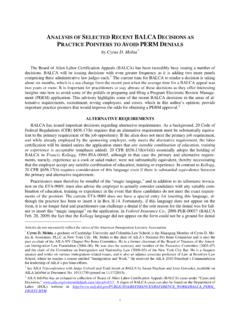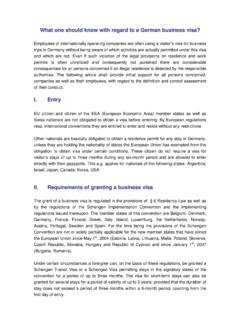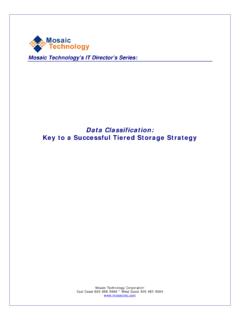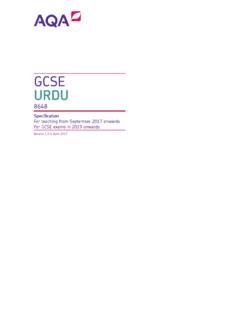Transcription of UK immigration: the Points Based System - 2008
1 UK immigration: the Points Based System - 2008. Introduction Impact on employers Statement of Intent: Sponsorship under the Points Based System Sponsor obligations and penalties Statement of Intent: Tier 1. Timeframe for implementation of Tier 1. Migrants eligible to apply from within the UK. Criteria Maintenance English language requirements Supporting evidence General grounds of refusal Single application process Transitional arrangements Period of leave Settlement Border control Further assistance Introduction In December 2007, the Border and Immigration Agency (BIA) released the first two in a series of Statements of Intent relating to the implementation of a new Points Based System (PBS).
2 A Statement of Changes to the Immigration Rules was laid before Parliament on 6 February 2008, setting out the new Rules. The first phase of the Government's PBS for UK immigration was launched on 29 February 2008, commencing with Tier 1 (General) for highly skilled migrants. The PBS, which represents the most significant change in UK immigration law for 40 years, will ultimately almost entirely replace the current System and will consist of five tiers (with further subdivisions) comprising: Tier 1: highly skilled, entrepreneurs, investors and post-study workers.
3 Tier 2: skilled workers (replaces the work permit scheme);. Tier 3: low skilled;. Tier 4: students;. Tier 5: temporary workers and youth mobility. With the exception of Tier 1, all applicants must be sponsored by a licensed sponsor. Impact on employers The PBS will involve significant changes for employers wishing to employ foreign nationals in the UK. From 2008, such employers must register as licensed sponsors. Notably there will be a greater onus on sponsors to ensure that foreign nationals satisfy entry criteria and comply with the conditions of their immigration permission, backed by increased penalties.
4 It is therefore critical that employers understand the requirements and implement processes to ensure compliance. Statement of Intent: Sponsorship under the Points Based System The BIA's Statement of Intent Sponsorship under the Points Based System ' sets out the sponsorship requirements for employers and educational institutions. The application to register as a licensed sponsor must be submitted online and the prescribed supporting documents then sent within 14 days. A sponsor entity with several branches may apply either to have a license for each branch or as a whole entity.
5 A. sponsorship licence will be valid for four years, which must be renewed before expiry. Sponsors will be classed into two ratings, A or B. Most sponsors will be A-rated unless the BIA deems that a sponsor poses certain greater risks, in which case it will be issued with a transitional B-rating. Once licensed, sponsors will be able to issue a certificate of sponsorship (COS) (an electronic reference number) to the prospective employee/student. The issue of a COS by the employer/institution will act as a pledge or undertaking that certain conditions are met and therefore represents a significant responsibility for the sponsor.
6 A further Statement of Intent will be published in 2008 detailing the Tier 2 criteria. Sponsor obligations and penalties The sponsor must maintain specific records of all foreign nationals it sponsors, and report to the BIA if the migrant fails to satisfy the conditions of immigration permission ( failure to turn up on their first day of employment/study or absence for 10 days or more without permission). In addition, the sponsor must report material changes (such as the migrant's change of address or change of employment).
7 The sponsor's compliance will be checked (with or without notice to the sponsor). The sponsor will be fully responsible for the actions of any employee acting on the sponsor's behalf, which may affect the sponsor's licence. In certain circumstances where a sponsor is considered not to be compliant, the sponsor may be downgraded to a B-rating or its license may be withdrawn. Sponsorship may also be suspended for investigation by the BIA and it may limit the number of certificates of sponsorship that a sponsor may issue. If a license is for one branch of a group with multiple sponsor licences, any penalty will be administered to that branch.
8 However, the BIA may examine the compliance of that branch and take any penalties administered into account when other branches of the same group make further applications. The BIA will issue formal rules on sponsorship under the PBS in the first quarter of 2008. In addition to sponsor licensing sanctions, under a new System of civil penalties in force from 29 February 2008, employers who negligently hire illegal workers could face a maximum fine of 10,000 for each illegal worker. Employers who are found to have knowingly hired illegal workers may be prosecuted and incur an unlimited fine and imprisonment.
9 Statement of Intent: Tier 1. The BIA's Statement of Intent, Highly Skilled Migrants Under the Points Based System ', sets out the requirements for applications under Tier 1 of the new PBS. Unlike other tiers, no sponsor is required for Tier 1 applications. The current highly skilled migrant programme (HSMP) and many other existing categories for the self-employed, investors and graduate workers will be subsumed within Tier 1, which will comprise the sub-categories outlined below. In all but the post study category, leave will be granted for three years initially, which may be extended for two years, all counting towards the five year residence period required to apply for settlement.
10 Timeframe for implementation of Tier 1. Tier 1 (General) will replace the current HSMP and will be introduced in three stages, depending upon the applicant's location: In the UK: 29 February 2008. In India: 1 April 2008. All other countries: by the end of the second quarter 2008. The remaining sub-categories of Tier 1 (entrepreneurs, investors and post-study workers). are expected to be introduced by the end of the second quarter of 2008. Migrants eligible to apply from within the UK. From 29 February 2008, only migrants with leave to remain in the UK in one of the following categories will be permitted to switch status within the UK to Tier 1 (General): highly skilled migrant, innovator, post-study worker, work permit holder, postgraduate doctor/dentist, student (including re-sitting an examination or writing a thesis), student nurse or participant in the International Graduate, Science and Engineering or Fresh Talent Working in Scotland schemes.













